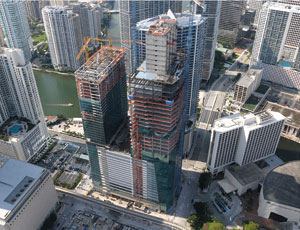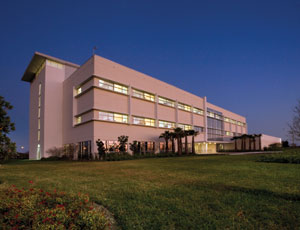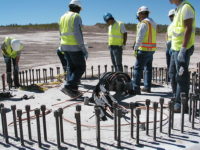Suffolk Construction Co. in West Palm Beach is weathering South Florida’s harsh brand of economic turmoil by branching out into new markets and embracing technology to streamline operations.


“We’re not growing, but we are staying even in our revenues,” says Rex Kirby, president and general manager of the Southeast Region for Suffolk. “At one point, I wasn’t happy about that, but now I’m tickled. It’s taken a lot of different strategies.”
Diversification—working in several different markets at once, such as schools, health care, office towers and hotels—is helping Suffolk manage in these economic times.
“We’re working in multiple markets successfully, and that differentiates us,” says Tim Sterling, vice president of Suffolk’s Miami operation.
Suffolk, a privately held company with more than $1 billion in revenues nationally, is working to secure more federal government projects. Each region dedicates personnel with experience in the federal arena to serve on a company committee that focuses on national government work.
“How you respond [to proposals] and some of the language can make a difference winning or losing,” Kirby says. “With people who have knowledge of that, we’ve been able to tweak our proposals to get to the point where we are winning some work.”
Suffolk recently received a contract to design and build a $13-million, 63,000-sq-ft Bachelor Enlisted Quarters at the Marine Corps Logistics Base in Albany, Ga. The LEED-designed project includes utilities, parking and antiterrorism force protection. Work will start in September and is scheduled for completion in 2011. Marcobay Construction of Lakeland, Fla., will perform the concrete shell and masonry work.
Kirby says he expects more owners will opt for design-build contracts, especially on federal projects.
“That delivery method has been successful for us,” he adds.
Suffolk also used design-build on the $40-million Torrey Pines Institute for Molecular Studies in Port St. Lucie, Fla., and the $25-million Port St. Lucie Civic Center, both completed last year.
Suffolk is pursuing work as a joint-venture partner with Marcobay and has been short-listed for a contract to build an elementary and middle school at Fort Bragg in North Carolina.
Marcobay has built office, school, retail and industrial projects. The partnership had chased a University of South Florida polytechnic project in Lakeland but did not receive the contract.
“We believed a local partner was desired by USF for this new campus,” Kirby says. “(Marcobay is) a good fit culturally, so we decided to look at other opportunities where we could bring value to each other, including other opportunities in and around Lakeland, and a project at Fort Bragg, where they already had resources from a past project and were able to self-perform concrete work.”



Post a comment to this article
Report Abusive Comment